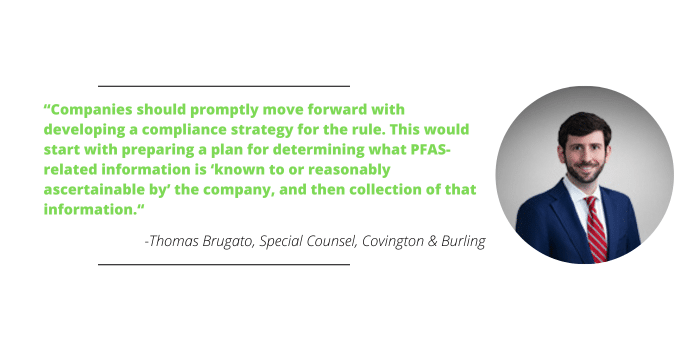The Environmental Protection Agency (EPA) has issued a final rule under the Toxic Substances Control Act (TSCA), which mandates reporting related to past manufacturing of PFAS substances.
- The ruling is expected to provide the public with the largest database of per- and polyfluoroalkyl substances (PFAS) – aka “forever chemicals” – made and used in the United States.
PFAS In Promo
The PFAS acronym describes a type of man-made chemical that have been used in manufacturing and consumer products since the 1940s.
- PFAS are used to make textiles, electronics, wires and cables, pipes, cooking and bakeware, sports equipment, automotive products, toys, transportation equipment and musical instruments, according to the EPA.
- Scientific studies have shown that exposure to some PFAS in the environment may be linked to harmful health effects, according to the ATSDR.

What You Need To Know
As a result of the final rule of TSCA, PFAS manufacturers and importers – including those in the promotional products industry – are estimated to spend approximately 11.6 million hours complying with this new rule, with an associated cost of $800-$843 million.
Thomas Brugato, an environmental attorney at Covington, has laid out a few important points to understand about the EPA’s final rule.
- Reporting is required for any company that has manufactured PFAS for commercial purposes since 2011. Companies that acquired PFAS domestically and used it in their operations would not be required to report under the rule.
- EPA will be publishing a list of substances online that are defined as PFAS. According to the EPA, its definition includes “at least 1,364 substances. Any previously existing lists of PFAS may not be an exhaustive source of included substances.
- Imported articles containing PFAS apply to the rule. If companies imported articles and can reasonably ascertain that those articles contain PFAS, they must adhere to the required reporting.
- There is no exception for small businesses or small volume. Besides a later reporting date for small businesses, the rule applies to equally to small businesses and is not affected by a minimum volume of substance.
- Submissions are due in 2025. Companies will be required to submit their reports in the Spring 2025. Small businesses will have a later required date of reporting, which will land in Fall 2025.
- Each violation of the reporting requirements currently holds a maximum penalty of $46,989 per day. The EPA is allowed broad authority to investigate potential violations through requests for information or by conducting inspections.
“Companies should promptly move forward with developing a compliance strategy for the rule,” Brugato says. “This would start with preparing a plan for determining what PFAS-related information is ‘known to or reasonably ascertainable by’ the company, and then collection of that information.”


